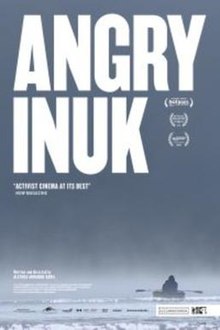
Tanya Tagaq, also credited as Tagaq, is a Canadian Inuk throat singer, songwriter, novelist, and visual artist from Cambridge Bay (Iqaluktuuttiaq), Nunavut, Canada, on the south coast of Victoria Island.
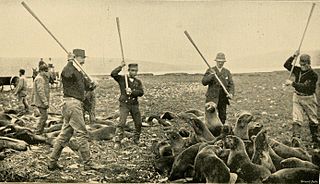
Seal hunting, or sealing, is the personal or commercial hunting of seals. Seal hunting is currently practiced in nine countries: United States, Canada, Namibia, Denmark, Iceland, Norway, Russia, Finland and Sweden. Most of the world's seal hunting takes place in Canada and Greenland.

Michelle Latimer is a Canadian actress, director, writer, and filmmaker. She initially rose to prominence for her role as Trish Simkin on the television series Paradise Falls, shown nationally in Canada on Showcase Television (2001–2004). Since the early 2010s, she has directed several documentaries, including her feature film directorial debut, Alias (2013), and the Viceland series, Rise, which focuses on the 2016 Dakota Access Pipeline protests; the latter won a Canadian Screen Award at the 6th annual ceremony in 2018.
The imagineNATIVE Film + Media Arts Festival is the world's largest Indigenous film and media arts festival, held annually in Toronto in the month of October. The festival focuses on the film, video, radio, and new media work of Indigenous, Aboriginal and First Peoples from around the world. The festival includes screenings, parties, panel discussions, and cultural events.
My Ancestors Were Rogues and Murderers is a 2005 National Film Board of Canada documentary film by Newfoundland filmmaker Anne Troake, which explores her own family's ties to the seal hunt and seeks to mount a defense for the now-controversial practice. Troake documents how the seal hunt began to attract international outrage in 1977 following opposition from the International Fund for Animal Welfare (IFAW) and a high-profile visit by French film star and animal rights activist Brigitte Bardot.

Sealskin is the skin of a seal.

Alethea Arnaquq-Baril is an Inuk filmmaker, known for her work on Inuit life and culture. She is the owner of Unikkaat Studios, a production company in Iqaluit, which produces Inuktitut films. She was awarded the Canadian Meritorious Service Cross, in 2017 in recognition of her work as an activist and filmmaker. She currently works part-time at the Qanak Collective, a social project which supports Inuit empowerment initiatives.
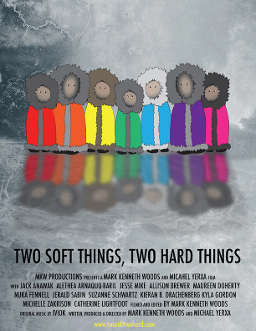
Two Soft Things, Two Hard Things is a Canadian documentary film, written, produced and directed by Mark Kenneth Woods and Michael Yerxa, which debuted at the Inside Out Film and Video Festival on June 3, 2016. The film was produced by MKW Productions and was shot in Nunavut.
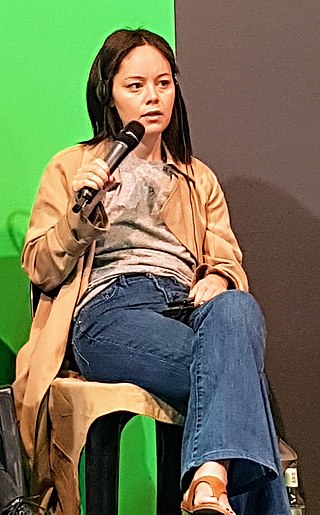
Nyla Innuksuk is a Canadian film director, writer, and producer, and virtual reality content creator. She is the CEO of Mixtape VR.

The Grizzlies is a 2018 Canadian sports drama film, directed by Miranda de Pencier. Based on a true story, the film depicts a youth lacrosse team that was set up to help combat an onslaught of youth suicide in the community of Kugluktuk, Nunavut.

Johnny Nurraq Seotaituq Issaluk is an Inuk actor, athlete, and cultural educator from Nunavut. He is best known for his roles in AMC's The Terror, the film Indian Horse, and in the BBC program The Misadventures of Romesh Ranganathan. In May 2019 he was named Royal Canadian Geographical Society's Explorer-in-Residence.

nîpawistamâsowin: We Will Stand Up is a Canadian documentary film, directed by Tasha Hubbard and released in 2019. The film centres on the 2016 death of Colten Boushie, and depicts his family's struggle to attain justice after the controversial acquittal of Boushie's killer. Narrated by Hubbard, the film also includes a number of animated segments which contextualize the broader history of indigenous peoples of Canada.
One Day in the Life of Noah Piugattuk is a Canadian drama film, directed by Zacharias Kunuk and released in 2019. The film dramatizes the true story of Noah Piugattuk, an Inuk hunter, over the day in 1961 when he was fatefully approached by a Canadian government agent who encouraged him to give up the traditional Inuit lifestyle and assimilate into a conventionally modern settlement.
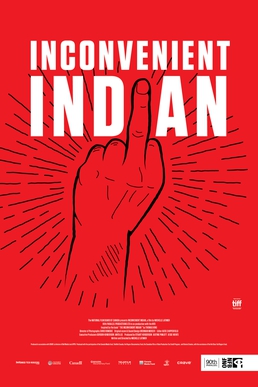
Inconvenient Indian is a 2020 Canadian documentary film, directed by Michelle Latimer. It is an adaptation of Thomas King's non-fiction book The Inconvenient Indian, focusing on narratives of indigenous peoples of Canada. King stars as the documentary's narrator, with Gail Maurice and other indigenous artists appearing.

Kakiniit are the traditional tattoos of the Inuit of the North American Arctic. The practice is done almost exclusively among women, with women exclusively tattooing other women with the tattoos for various purposes. Men could also receive tattoos but these were often much less extensive than the tattoos a woman would receive. Facial tattoos are individually referred to as tunniit (ᑐᓃᑦ), and would mark an individual's transition to womanhood. The individual tattoos bear unique meaning to Inuit women, with each individual tattoo carrying symbolic meaning. However, in Inuinnaqtun, kakiniq refers to facial tattoos.
Twice Colonized is a documentary film, directed by Lin Alluna and released in 2023. A coproduction of companies from Canada, Denmark and Greenland, the film profiles Aaju Peter, an Inuk lawyer and activist who has lived in both Greenland and Nunavut, profiling both her lifelong fight for justice for Inuit peoples and the personal struggles and traumas she dealt with along the way.
Saqpinaq Carol Kunnuk is an Inuk actress and filmmaker from Canada, noted for her work with both Arnait Video Productions and Isuma Studios.
